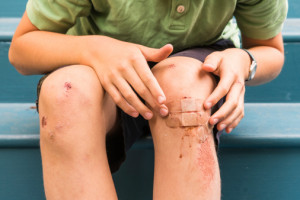Solving summer health concerns

Dehydration
In the midst of playing or working outside, it can be easy to forget to rehydrate. And even though you might not feel dehydrated, the rule is that once you’re thirsty, you are already dehydrated. Combat that by making sure to drink plenty of water, even if you don’t feel like you need any.
“Drinking water or sports drinks throughout the day is a great way to keep yourself from getting dehydrated. Stay away from caffeinated beverages and alcohol,” says Dr. David Targan, internal medicine physician at Lankenau Medical Center.
Make a note to stop every hour for a drink of water, or bring a large water bottle filled with ice and water outside with you as a constant reminder to drink up. If you or your child is dehydrated, bring them inside and drink water for 1-2 hours to regain the lost fluid. If dizziness or a headache persists, it’s time to call the doctor.
Sunburn
The best protection against sunburn is to find a sunscreen that’s right for you and apply it regularly during the time you’re spending outside. Still, sunburn can happen even if you’re careful. If it does, aloe is the best solution. Many grocery or drug stores offer it as a lotion, gel, or spray, so choose what texture works best for you and make sure to reapply regularly to keep the skin moisturized and burning or itching at bay. If you don’t have access to aloe right away, head to the kitchen and wrap a bag of ice in a damp towel to cool the skin.
Fever and headache can also be accompanying symptoms of severe sunburn. To ease these symptoms, take an ibuprofen or aspirin as needed.
Summer heat
On especially hot days during the summer, it’s best to stay inside whenever you can, but it doesn’t take a 90-degree day to make you feel the effects of heat. Spending a long day outside doing lawn work or at the pool on a warm day can take its toll. If you or someone else begins to feel tired, weak, nauseous or develops a headache, it’s time to head inside.
“The worst thing you can do in a heat illness situation is ignore it,” explains Dr. Targan. “Don’t chalk it up to something else or try to push through it when you’re feeling weak or tired. Go inside or in the shade before it becomes more serious.”
Once inside, try loosening your clothing or jewelry, taking your shoes off, and splashing cool water on your face, neck and arms. Drink water to rehydrate while you’re inside, and, if you do need to go back outside, make sure to bring a water bottle with you and continue hydrating, even if you aren’t thirsty. If your condition worsens or doesn’t improve, call your doctor.
Most people spend all year waiting for summer weather, and are happy to take advantage of it when it arrives, but it’s important to make sure you’re being safe and healthy in the summer sun. For more, read Dr. Jason Kitchen's tips on curing burns, cuts and broken bones.
 Content you want, delivered to your inbox
Content you want, delivered to your inbox
Want to get the latest health and wellness articles delivered right to your inbox?
Subscribe to the Well Ahead Newsletter.
